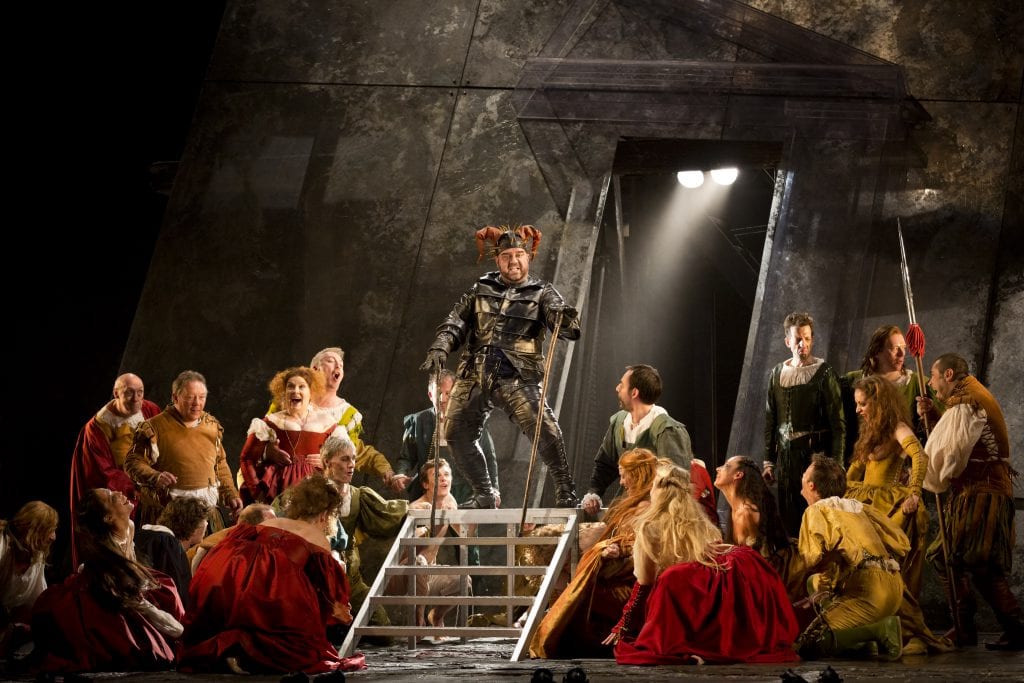The Royal Opera’s revival of David McVicar’s 2001 production of Rigoletto fittingly dedicated to the most sought-after Russian baritone Dmitri Hvorostovsky who died last month, on 22 November, aged just 55. He frequented Covent Garden’s stage including the title role of this production in 2005. “… his performances marked by extraordinary intensity, and a velvety darkness of tone as distinctive as his mane of silver hair” (Jessica Duchen).
The grey set can hardly be said to evoke the splendour of a decadent royal ballroom suggested in the libretto. It is more like a decaying and seedy place where depravity is at large. Michael Vale’s set design with Tanay McCallin’s exquisite 17th century colourful costume dates events to roughly the period in which the opera is set and conjures up the ills of society and its decadent monarch. Debauchery, particularly in the first scene, looms large and is intended to shock.
Rigoletto based on Victor Hugo’s ill-fated 1832 play Le Roi s’amuse (The King Amuses Himself. The French censors closed it down after first night’s performance!). Piave introduce the modifications so as to appease the Austrian censors before it could be staged at La Fenice in Venice, then under the control of the Austro-Hungarian Empire. The King of France has been replaced by the inferior Duke of Mantua and the Duke’s jester, a complex tragic figure, is Rigoletto. The end result was an instant success, which hasn’t paled since its launch in 1851. The unfolding tale of abuse of power, sexual exploits of women, young in particular, rapes by the Duke of Mantua, assisted by his court in general and his jester, Rigoletto, in particular. All these horrors sail on waves of exquisite music that carries one from jovial to heart wrenching melodies with much epic drama and tempestuous scenes.
Dimitri Platanias’ Rigoletto, the deformed court jester, effectively fuses the physicality and the singing in this rather complex figure that instructs the Duke in vice and rears his daughter in virtue. Platanias performance is marked by a dark intensity. His facial expressions expose a deeply perturbed jester whose humour is laced with bitter resentment and scheming. The progressive breadth of this baritone’s voice heightens the drama in the stormy Acts 3 and 4. The unfolding plot rides, in part, on the velocity of the seamless transition in Platanias’ rendering of Rigoletto’s powerful voice from an almost tender and affectionate tone when addressing his daughter, to a sturdy one when addressing the courtiers. His voice then soars from restrained sorrow to heart-wrenching pain that then instantly morphs to joy when his daughter, Gilda, appears. He is a tragic anti-hero that, despite his vice, he is pitied rather than hated.
Sofia Fomina is a mature and meditative Gilda, yet there is a touch of Gilda’s naivety, which makes her a credible young woman, over protected from her father’s society.
The tragic sequence arises from the thuggish and debauchery of the Duke of Mantua. Michael Fabio’s duke lacks oomph. He looks the part and clearly has the voice but his performance is flaccid and short of dramatic energy.
There are a few hiccups that affected coordination between orchestra and singers when Alexander Joel, the conductor, may have taken his eyes off the stage, but considered overall it is an enjoyable and stimulating evening.

